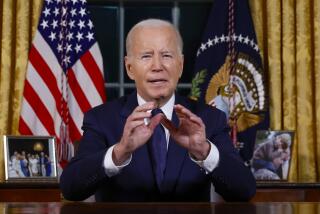Myanmar: A Test Case for U.S. Principles
WASHINGTON — Myanmar may seem like a faraway place, yet it serves as the best indicator in the world today of the role of values and principles in U.S. foreign policy.
And it raises questions of considerable importance to the presidential campaign: How might a new Bush-Cheney administration, with close ties to the U.S. oil industry, reconcile the conflict between commercial interests and democratic ideals in a place like Myanmar?
Over the last few days, Nobel Peace Prize winner Aung San Suu Kyi has been trapped in a muddy field outside Myanmar’s capital city of Yangon (Rangoon) because Myanmar’s military junta refuses to let her travel around the country.
Aung San Suu Kyi, a disciple of nonviolence, is often referred to as the leader of Myanmar’s opposition forces. But in a way that term is misleading, because by rights she should be considered the country’s elected leader.
Her party, the National League for Democracy, won Myanmar’s only election in 1990 with an overwhelming 82% of the nationwide vote. But the military leaders refused to give up power. Aung San Suu Kyi spent much of the last decade under house arrest.
She is now challenging the restrictions that have prohibited her from leaving Yangon. Last Thursday, she and 14 supporters left the capital to try to meet with party leaders in a town 30 miles away. Police vehicles blocked the road and forced them into a field, where they have remained for several days, sleeping in their vehicles or in tents.
Myanmar’s military leaders say they want to keep Aung San Suu Kyi safe from “terrorists” or others who might want to harm her.
Exactly who might want to hurt her? Perhaps the regime or its supporters, the government’s own statements suggest. On Tuesday, the government added a chilling Orwellian twist to its earlier rationalizations: Aung San Suu Kyi needs to be protected, it asserted, because there are “sound reasons for resentment and indignation toward her.” It accused her of encouraging foreign governments to impose economic sanctions against Myanmar.
The United States is among the countries that have imposed sanctions. However much the Clinton administration has wavered in its policies toward other countries, notably China, it has been consistent and relatively tough over the last eight years in dealing with Myanmar.
A 1996 law supported by the Clinton administration prohibits new American investment in Myanmar. The United States also has blocked international lending to Myanmar. Secretary of State Madeleine Albright has repeatedly voiced strong personal support for Aung San Suu Kyi and for democracy in Myanmar.
Privately, Clinton administration officials argue that Myanmar represents a classic example of where economic sanctions are justified.
The regime is unusually repressive, and the sanctions deny it legitimacy, administration officials say. American commercial interests in Myanmar are minuscule in comparison to China. And the U.S. sanctions serve to restrain other governments, like Japan, from moving too quickly to invest in Myanmar.
This week, the Clinton administration issued a strong statement supporting Aung San Suu Kyi’s right to travel freely. “Freedom of movement is a fundamental, internationally recognized human right,” the State Department noted.
Still, the administration’s unusually firm stand against Myanmar has been unpopular with the business community. The anti-boycott organization USA*Engage, set up and funded by U.S. corporations, has urged Congress to lift the sanctions against Myanmar. Oil companies like Unocal, the leading American investor in Myanmar, have been eager to expand their operations there.
What would a new Republican administration do? To what extent would it support Aung San Suu Kyi’s movement for democracy? Would it stick with the Clinton administration’s policies of keeping economic pressure on the Myanmar junta?
George W. Bush and Dick Cheney, the GOP presidential ticket, are former oil executives. Cheney, in particular, has been especially fervent in his opposition to the use of unilateral American sanctions. “They almost never work,” he argued in a speech two years ago.
Those facts would seem to suggest that a new Bush administration would ease up on the existing Clinton-Gore policy toward Myanmar. And yet within the Republican Party, there are also currents in the opposite direction.
During the middle to late 1980s, the Republicans developed a strong tradition of support for democratic leaders and movements in Asia.
The Reagan administration pressed successfully for democratic changes in the Philippines and in South Korea. Some of the leading alumni of that administration, such as Richard L. Armitage and Paul Wolfowitz, are now serving as foreign policy advisors to Bush.
Moreover, one of Aung San Suu Kyi’s strongest supporters has been Sen. Mitch McConnell (R-Ky.), who has pushed to tighten, not loosen, the sanctions against Myanmar.
So as Aung San Suu Kyi and the military junta continue their standoff in Myanmar, the question in Washington is what will happen to American policy there if the Republicans take the White House.
Will Big Oil win out and gain an end to U.S. sanctions in Myanmar? Or will the Republicans support Aung San Suu Kyi in 2001, as they did the Philippines’ Corazon Aquino in 1986?
In short, what kind of foreign policy would we get in a new Republican administration? Maybe the candidates can tell us.
*
Jim Mann’s column appears in this space every Wednesday.
More to Read
Sign up for Essential California
The most important California stories and recommendations in your inbox every morning.
You may occasionally receive promotional content from the Los Angeles Times.










